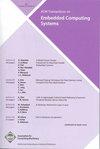Co-Approximator: Enabling Performance Prediction in Colocated Applications.
IF 2.8
3区 计算机科学
Q2 COMPUTER SCIENCE, HARDWARE & ARCHITECTURE
引用次数: 0
Abstract
Today’s Internet of Things (IoT) devices can colocate multiple applications on a platform with hardware resource sharing. Such colocations allow for increasing the throughput of contemporary IoT applications, similar to the use of multi-tenancy in clouds. However, avoiding performance interference among colocated applications through virtualized performance isolation is expensive in IoT platforms due to resource limitations. Hence, on the one hand, colocated IoT applications without performance isolation contend for shared limited resources, which makes their performance variance discontinuous and a priori unknown. On the other hand, different combinations of colocated applications make the overall state space exceedingly large. All of these make such colocated routines challenging to predict, making it difficult to plan which applications to colocate on which platform. We propose Co - Approximator , a technique for systematically sampling an exponentially large colocated application state space and efficiently approximating it from only four available complete colocation samples. We demonstrate the performance of Co - Approximator with seventeen standard benchmarks and three pipelined data processing applications on different IoT platforms, where on average, Co - Approximator reduces existing techniques’ approximation error from 61% to just 7%.Co-Approximator:实现同地应用的性能预测。
如今的物联网(IoT)设备可以将多个应用程序集中在一个平台上,实现硬件资源共享。这种共享可以提高当代物联网应用的吞吐量,类似于云中多租户的使用。然而,由于资源限制,在物联网平台中通过虚拟化性能隔离来避免共用应用程序之间的性能干扰代价高昂。因此,一方面,没有性能隔离的同地物联网应用会争夺共享的有限资源,这使得它们的性能差异不连续且先验未知。另一方面,不同组合的同地应用程序会使整体状态空间变得异常庞大。所有这些都使得这种同地运行的例程难以预测,从而难以规划在哪个平台上同地运行哪些应用程序。 我们提出了 Co - Approximator,这是一种系统地对指数级庞大的主机托管应用状态空间进行采样,并从仅有的四个完整主机托管采样中高效逼近的技术。我们在不同的物联网平台上使用 17 个标准基准和 3 个流水线数据处理应用演示了 Co - Approximator 的性能,平均而言,Co - Approximator 将现有技术的近似误差从 61% 降低到仅 7%。
本文章由计算机程序翻译,如有差异,请以英文原文为准。
求助全文
约1分钟内获得全文
求助全文
来源期刊

ACM Transactions on Embedded Computing Systems
工程技术-计算机:软件工程
CiteScore
3.70
自引率
0.00%
发文量
138
审稿时长
6 months
期刊介绍:
The design of embedded computing systems, both the software and hardware, increasingly relies on sophisticated algorithms, analytical models, and methodologies. ACM Transactions on Embedded Computing Systems (TECS) aims to present the leading work relating to the analysis, design, behavior, and experience with embedded computing systems.
 求助内容:
求助内容: 应助结果提醒方式:
应助结果提醒方式:


